Charles E W Bean, Diaries, AWM38 3DRL 606/244/1 - 1916 - 1933 - Part 16
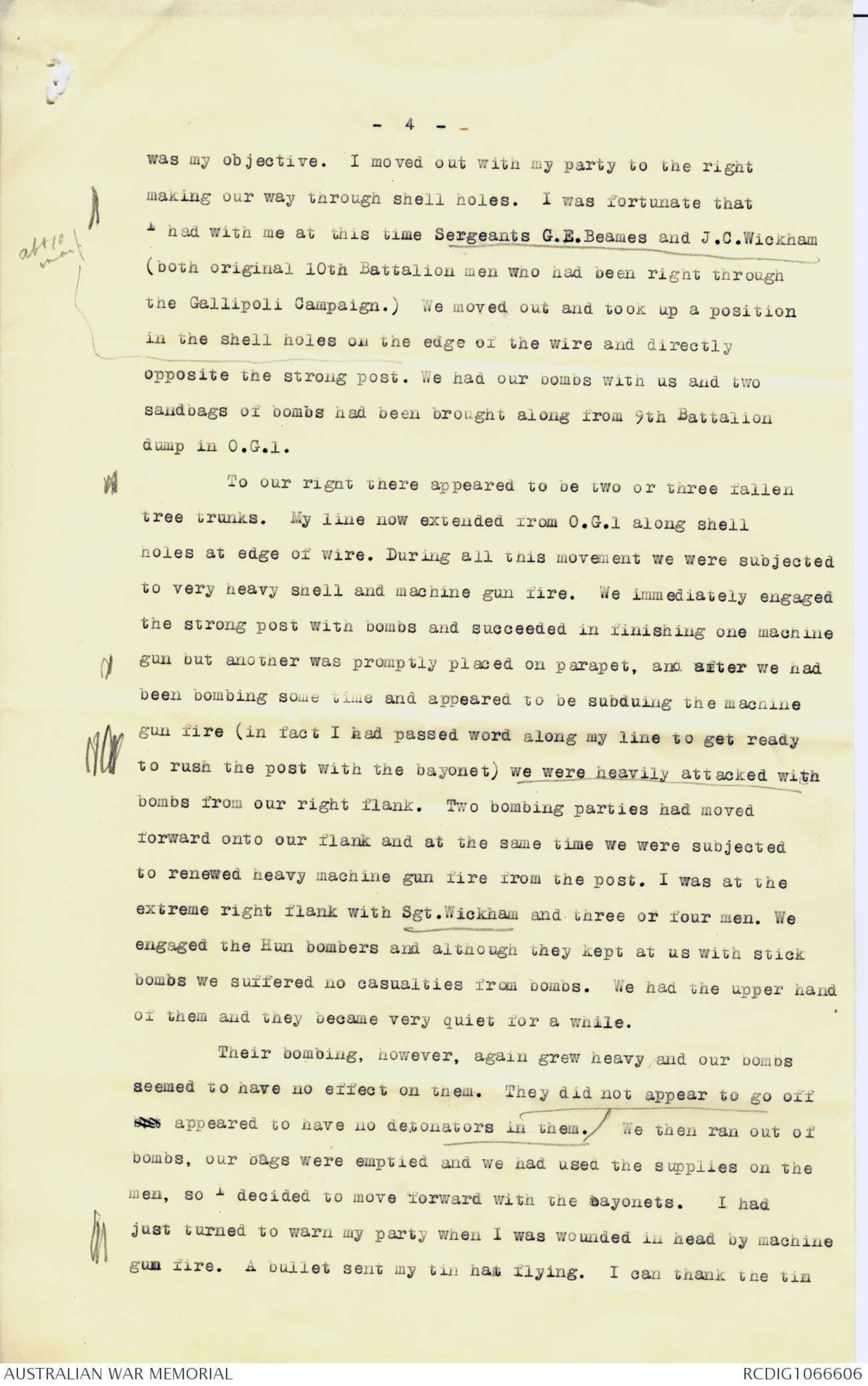
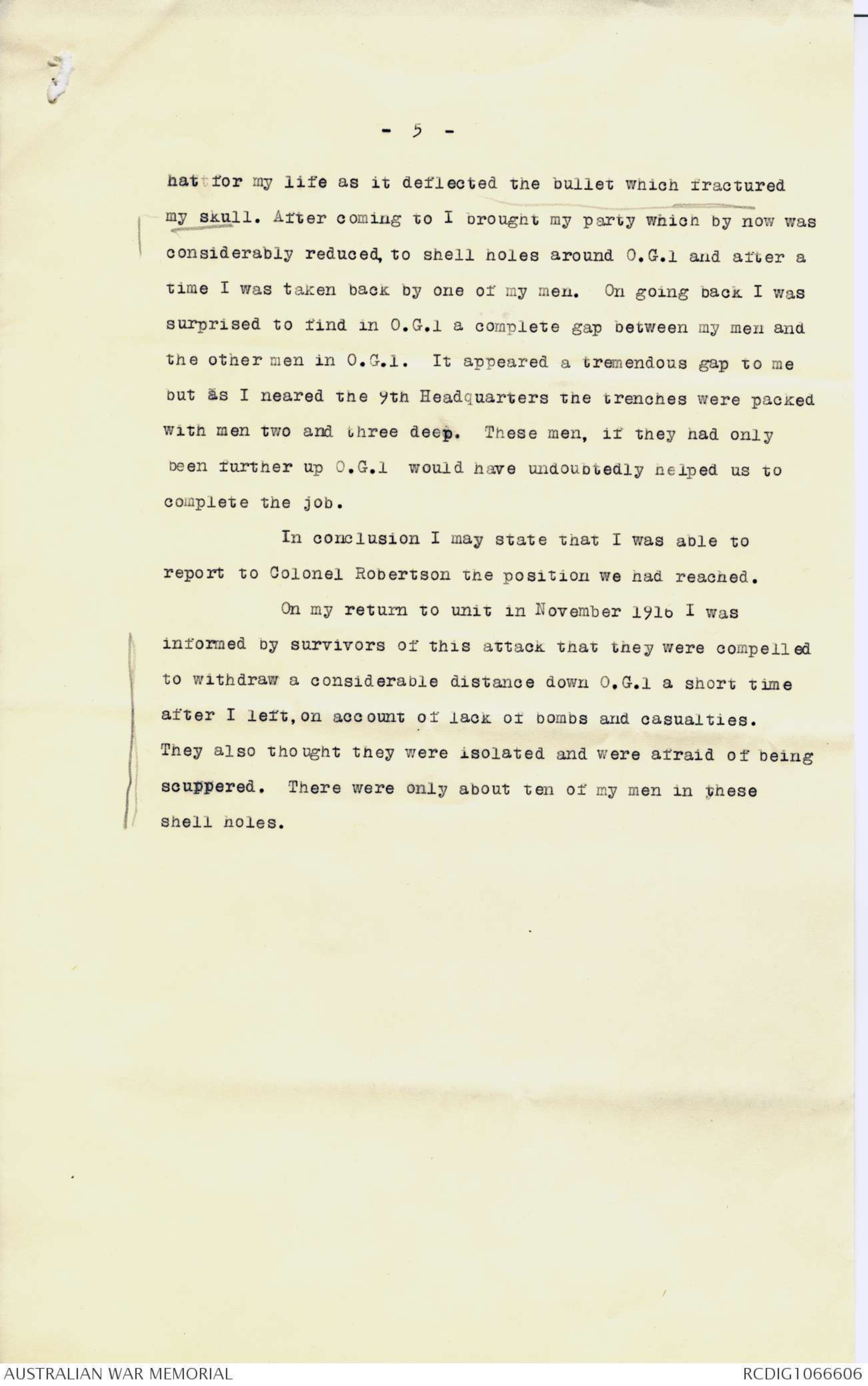
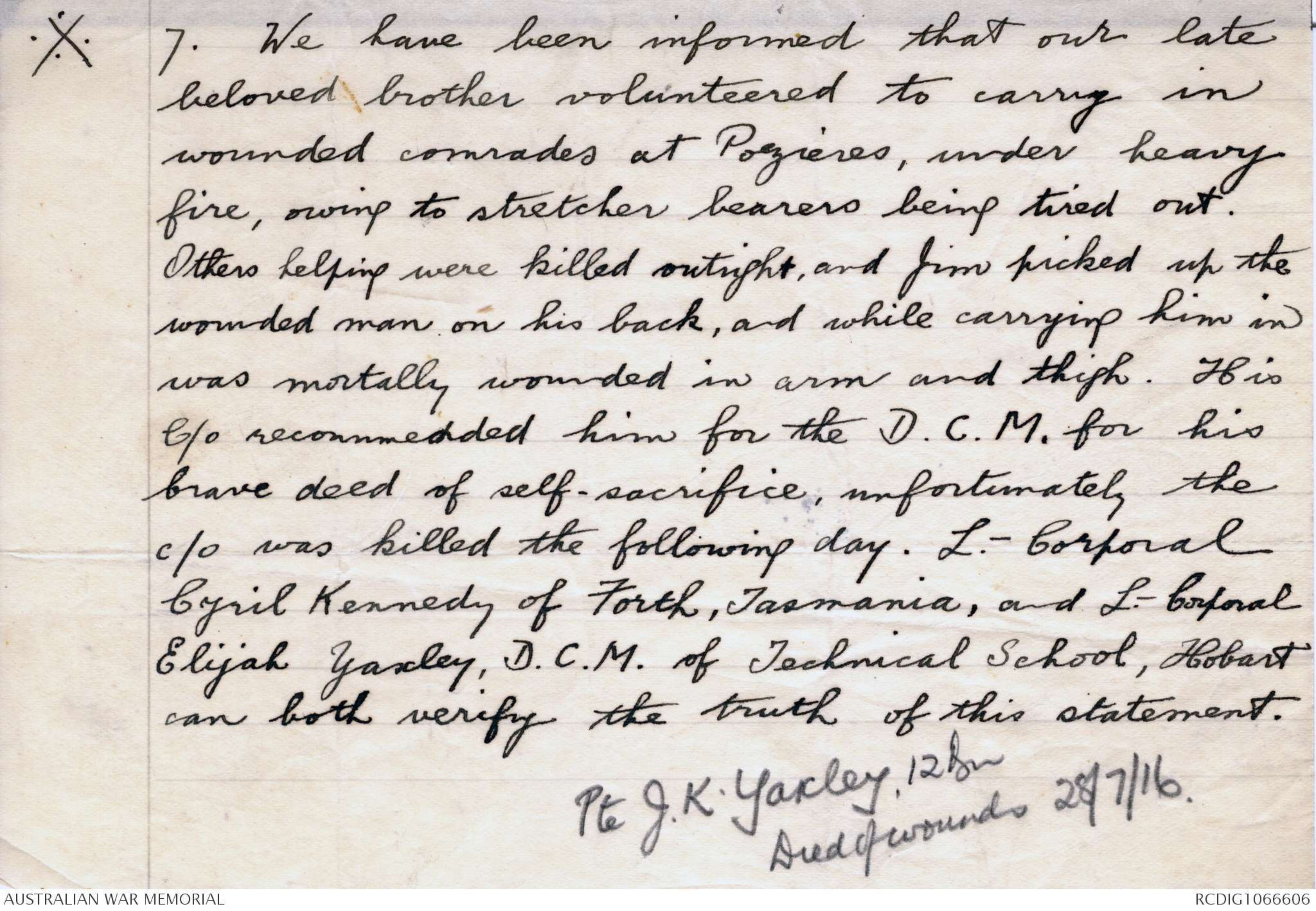
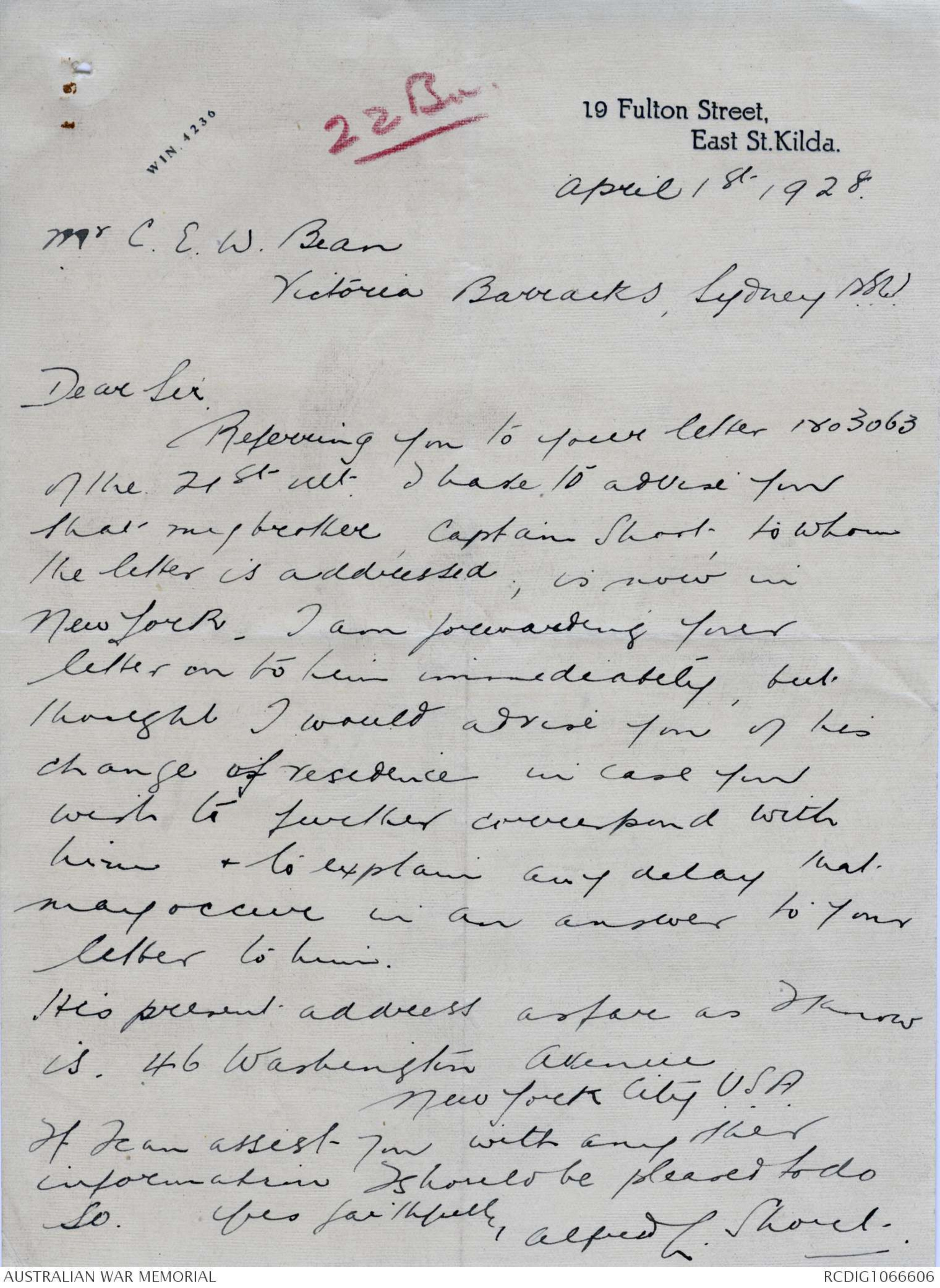
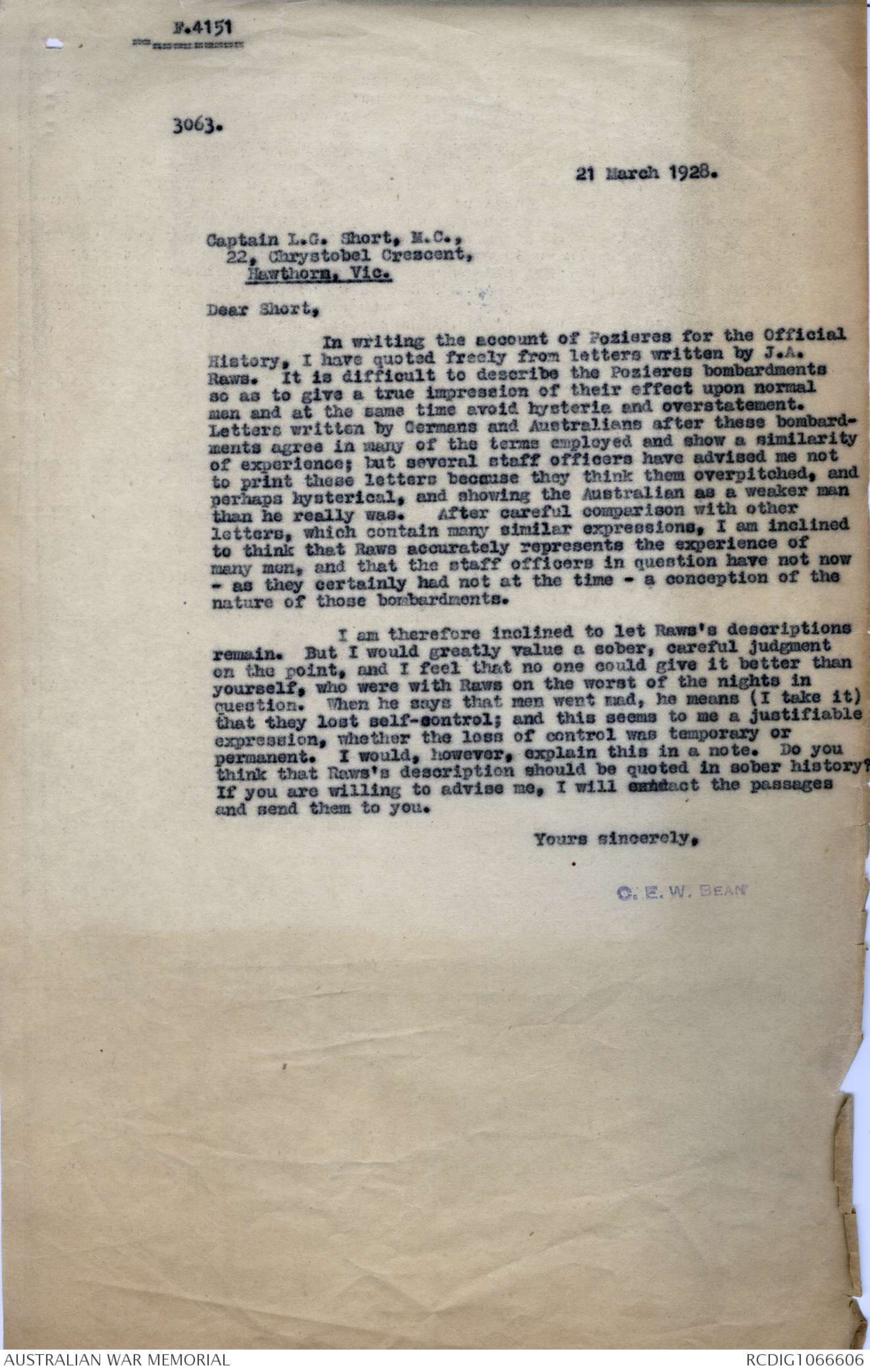
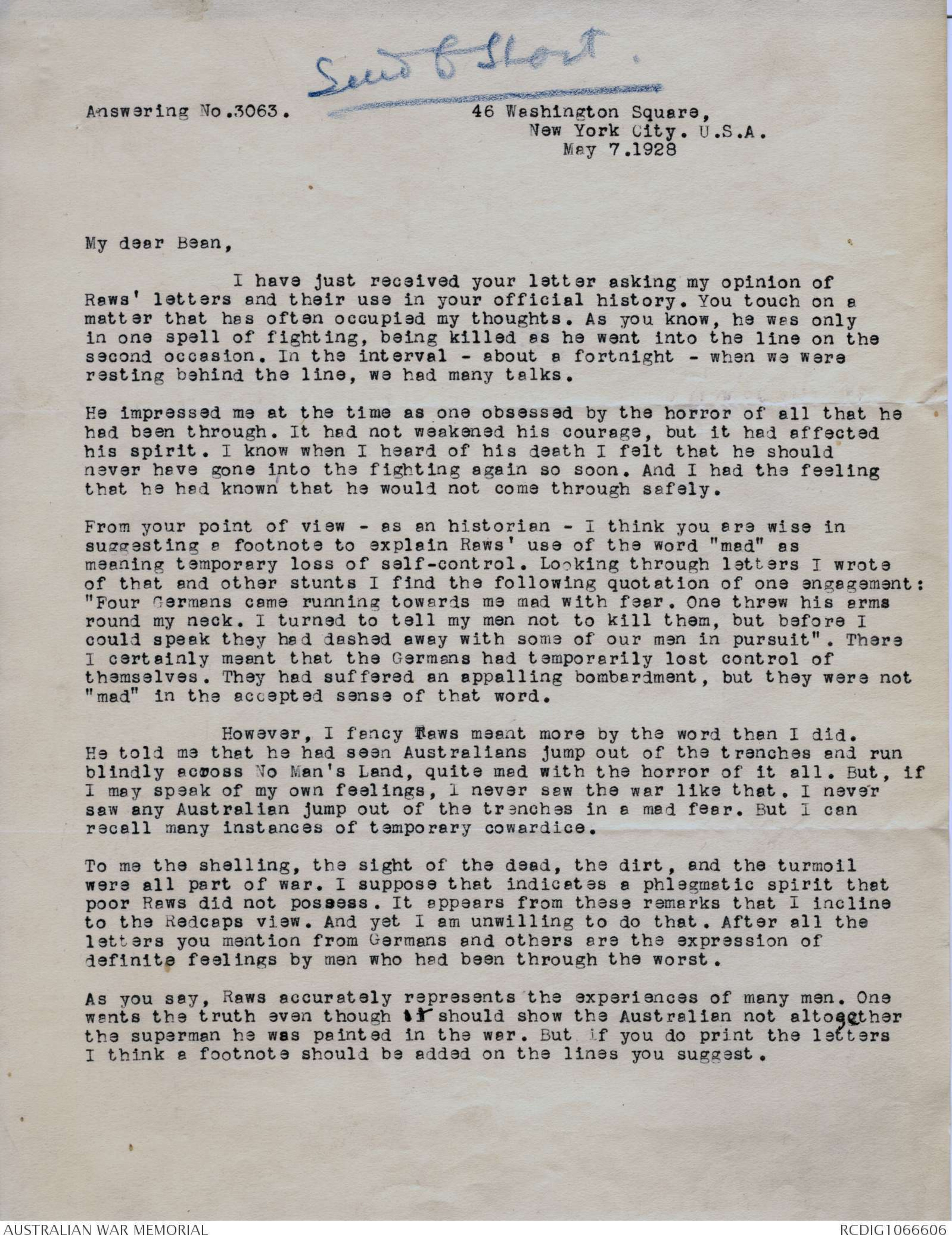
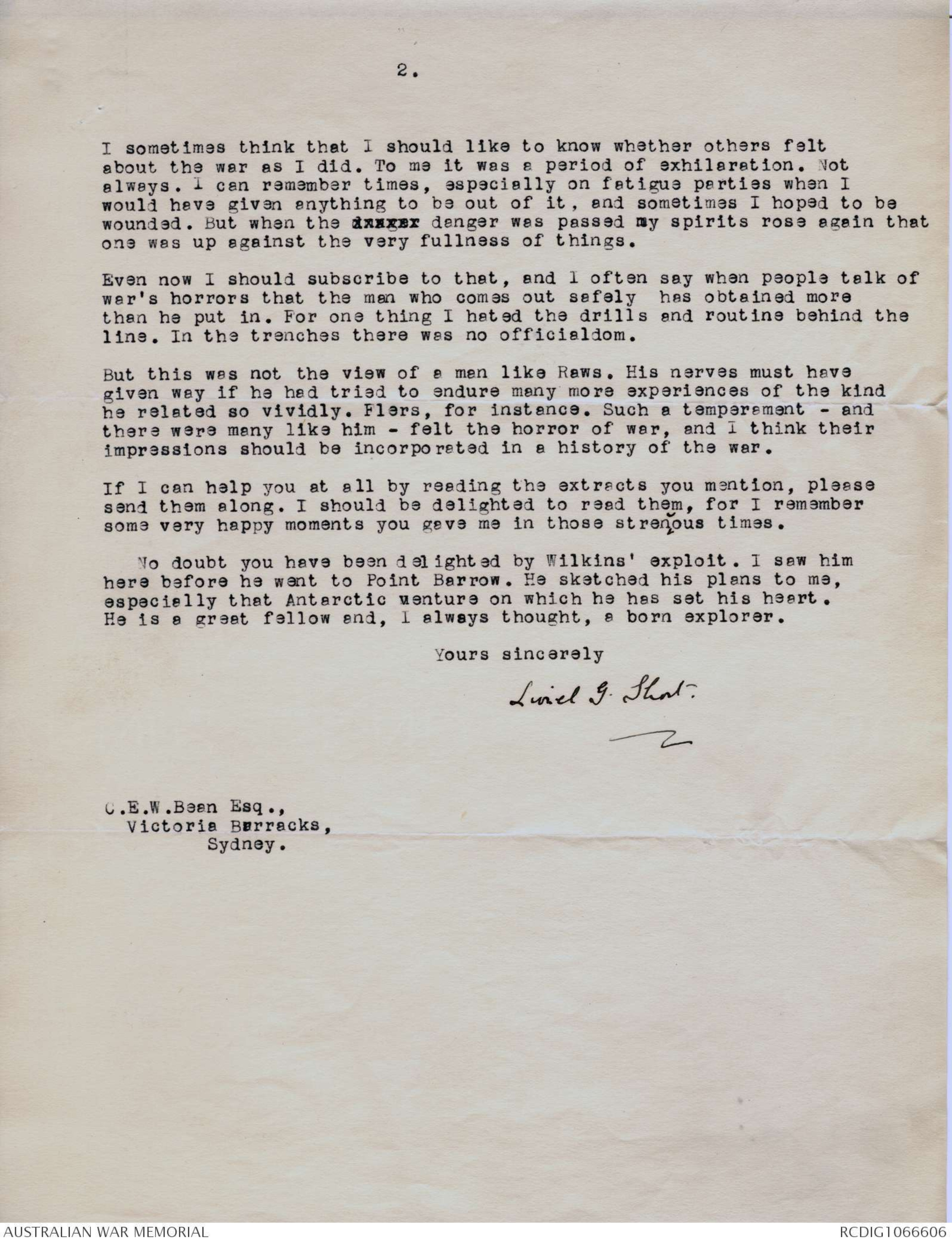
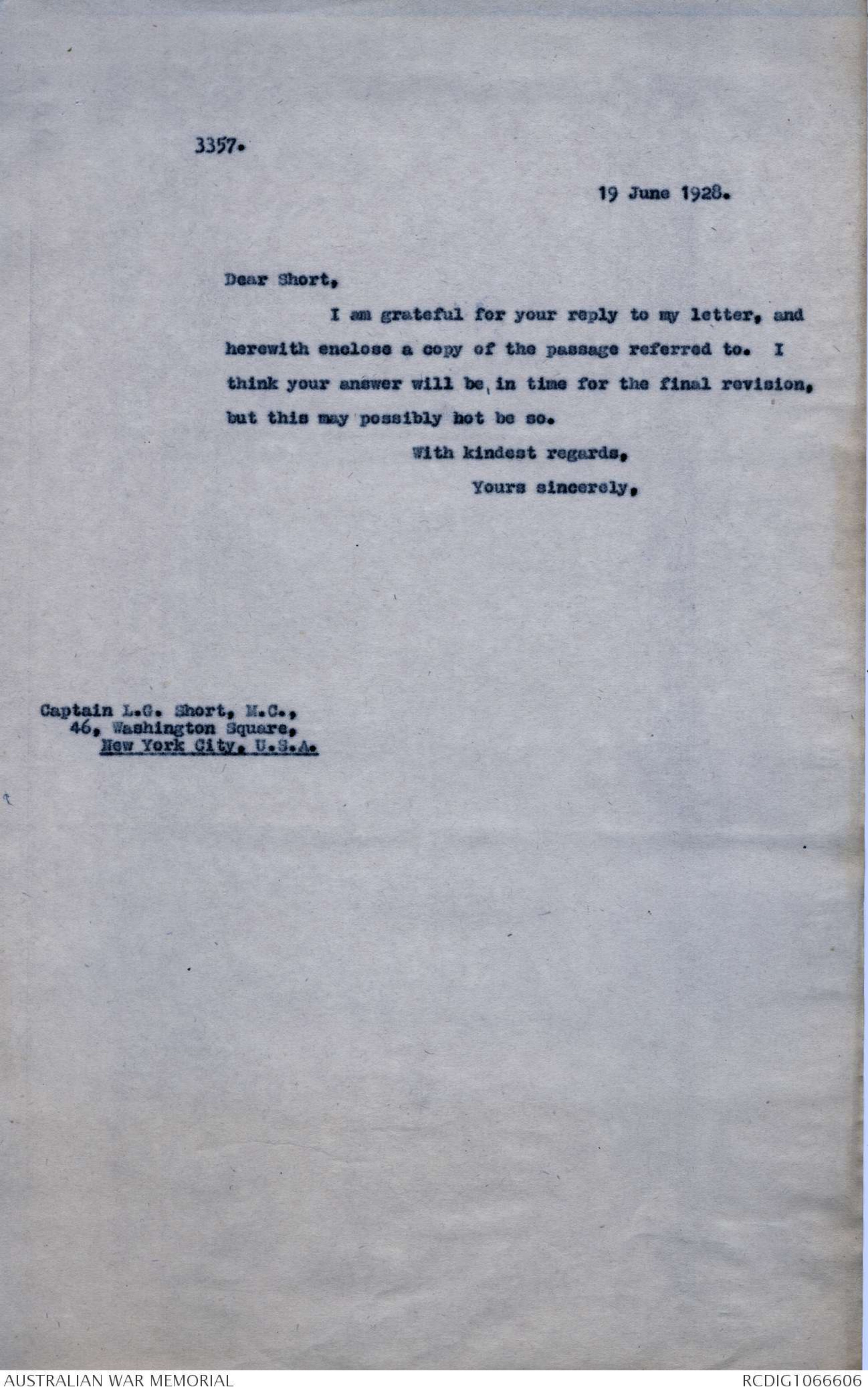
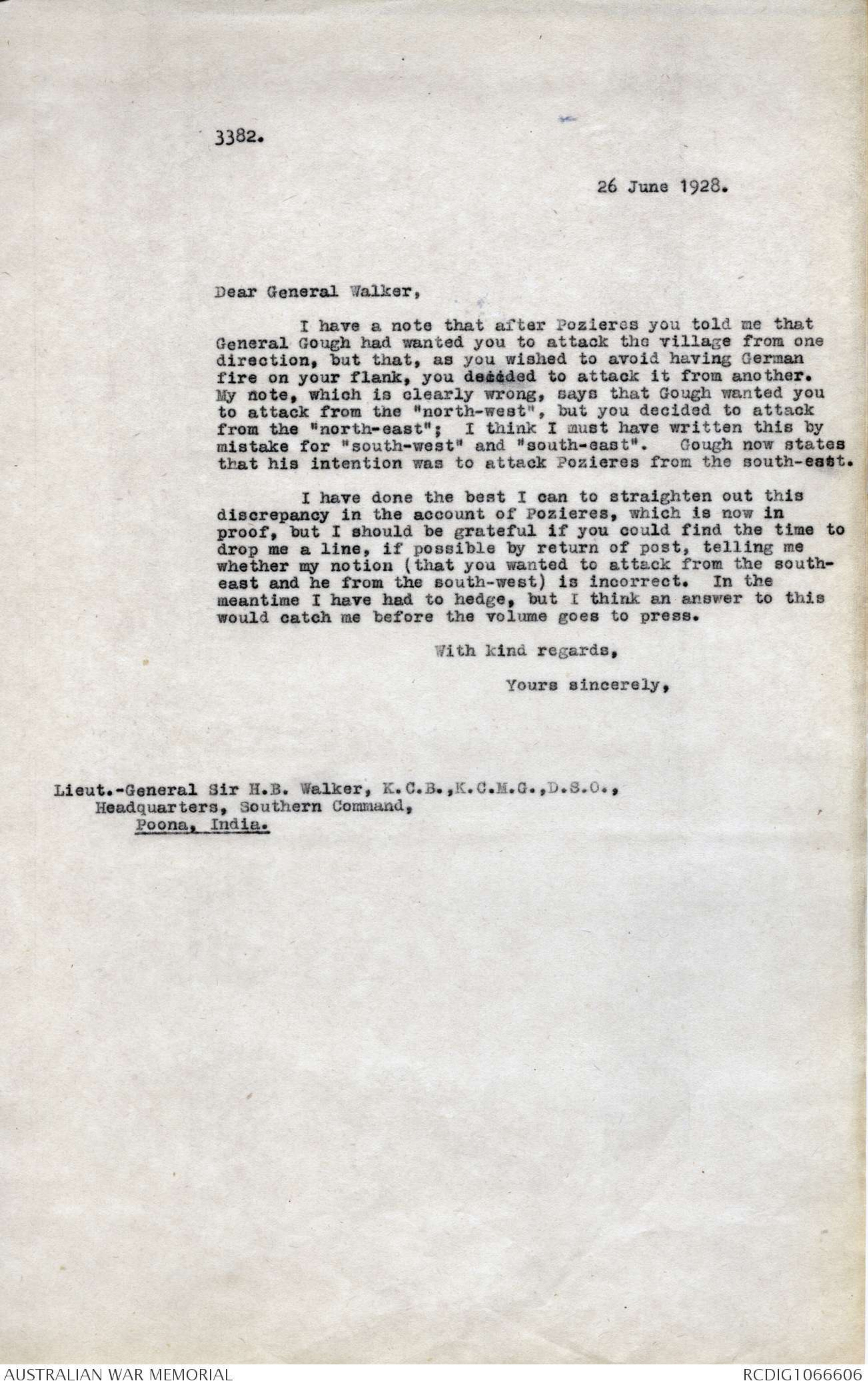
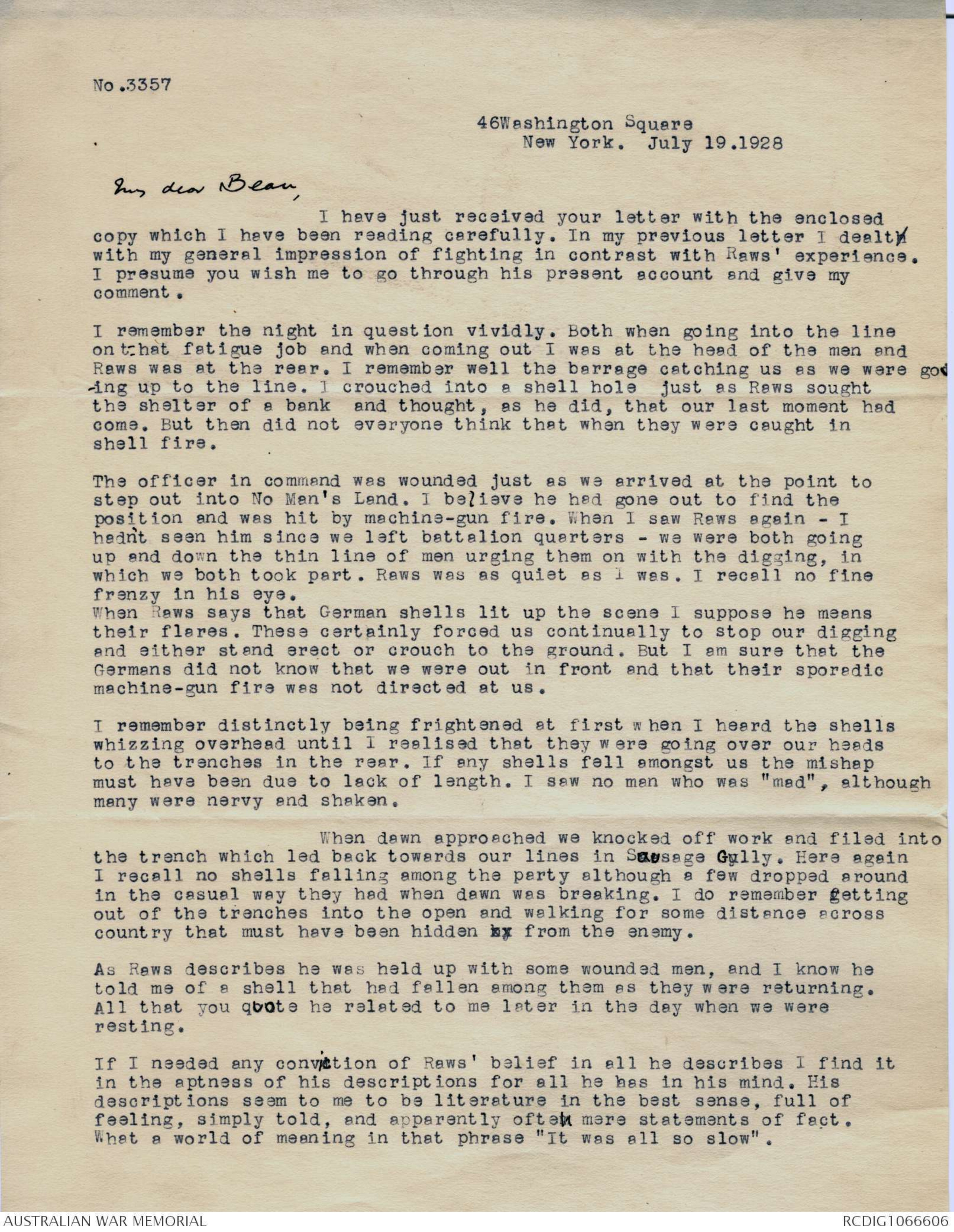
-4-
was my objective. I moved out with my party to the right
making our way through shell holes. 1 was fortunate that
I had with me at this time Sergeants G.E. Beames and J. C. Wickham
(both original 10th Battalion men who had been right through
the Gallipoli Campaign.) We moved out and took up a position
in the shell holes on the edge of the wire and directly
[*abt 10 men*^]opposite the strong post.^ We had our bombs with us and two
sandbags of bombs had been brought along from 9th Battalion
dump in O.G.1.
To our right there appeared to be two or three fallen
tree trunks. My line now extended From O.G.1 along shell
holes at edge of Wire, During all this movement we were subjected
to very heavy shell and machine gun Lire. We immediately engaged
the strong post with bombs and succeeded in finishing one machine
gun but another was promptly placed on parapet, and after we had
been bombing some time and appeared to be subduing the machine
gun fire (in fact I had passed word along my line to get ready
to rush the post with the bayonet) we were heavily attacked with
bombs from our right flank. Two bombing parties had moved
forward onto our flank and at the same time we were subjected
to renewed heavy machine gun fire from the post. I was at the
extreme right Flank with Sgt. Wickham and three or four men. We
engaged the Hun bombers and although they kept at us with stick
bombs we suffered no casualties from bombs. We had the upper hand
of them and they became very quiet for a while.
Their bombing, however, again grew heavy and our bombs
seemed to have no effect on then. They did not appear to go off
appeared to have no detonators in them. We then ran out of
bombs, our bags were emptied and we had used the supplies on the
men, so I decided to move forward with the bayonets. I had
just turned to warn my party when I was wounded in head by machine
gum Lire. A bullet sent my tin hat flying. I can thank the tin
-5-
hat for my life as it deflected the bullet which fractured
my skull. After coming to I brought my party which by now was
considerably reduced, to shell holes around O.G.1 and after a
time I was taken back by one of my men. On going back I was
surprised to find in O.G.1 a complete gap between my men and
the other men in O.G.1 It appeared a tremendous gap to me
but as I neared the 7th Headquarters the trenches were packed
with men two and three deep. These men, if they had only
been further up O.G.1 would have undoubtedly helped us to
complete the job.
In conclusion I may state that I was able to
report to Colonel Robertson the position we had reached.
On my return to unit in November 1916 I was
informed by survivors of this attack that they were compelled
to withdraw a considerable distance down O.G.1 a short time
after I left, on account of lack of bombs and casualties.
They also thought they were isolated and were afraid of being
scuppered. There were only about ten of my men in these
shell holes.
※ 7
We have been informed that our late
beloved brother volunteered to carry in
wounded comrades at Pozieres, under heavy
fire, owing to stretcher bearers being tired out.
Others helping were killed outright, and Jim picked up the
wounded man on his back, and while carrying him in
was mortally wounded in arm and thigh. His
C/O recommended him for the D.C.M. for his
brave deed of self-sacrifice, unfortunately the
C/O was killed the following day. L.- Corporal
Cyril Kennedy of Forth, Tasmania, and L-Corporal
Elijah Yaxley, D.C.M. of Technical School, Hobart
can both verify the truth of this statement.
Pte J.K. Yaxley 12 Bn
Died of wounds 28/7/16
WIN.4236
22 Bn
19 Fulton Street
East St. Kilda.
April 1st 1928.
Mr C. E. W. Bean
Victoria Barracks, Sydney N.S.W.
Dear Sir
Referring you to your letter 1803063
of the 21st inst. I have to advise you
that my brother Captain Short to whom
the letter is addressed, is now in
New York. I am forwarding your
letter on to him immediately, but
thought I would advise you of his
chance of residence in case you
wish to further correspond with
him & to explain any delay that
may occur in an answer to your
letter to him.
His present address as fare as I know
is 46 Washington Avenue
New York City U.S.A
If I can assist you with any the
information I should be pleased to do
Yours faithfully
Alfred L. Showel
F.4151
3063.
21 March 1928.
Captain L.G. Short, M.C.,
22, Chrystobel Crescent,
Hawthorn, Vic.
Dear Short,
In writing the account of Pozieres for the Official
History, I have quoted freely from letters written by J.A.
Raws. It is difficult to describe the Pozieres bombardments
so as to give a true impression of their effect upon normal
man and at the same time avoid hysteria and overstatement.
Letters written by Germans and Australians after these bombardments
agree in many of the terms employed and show a similarity
of experience; but several staff officers have advised me not
to print these letters because they think them overpitched, and
perhaps hysterical, and showing the Australian as a weaker man
than he really was. After careful comparison with other
letters, which contain many similar expressions, I am inclined
to think that Raws accurately represents the experience of
many men, and that the staff officers in question have not now
- as they certainly had not at the time - a conception of the
nature of those bombardments.
I am therefore inclined to let Raws's descriptions
remain. But I would greatly value a sober, careful judgment
on the point, and I feel that no one could give it better than
yourself, who were with Raws on the worst of the nights in
question. When he says that men went mad, he means (I take it)
that they lost self-control; and this seems to me a justifiable
expression, whether the loss of control was temporary or
permanent. I would, however, explain this in a note. Do you
think that Raws's description should be quoted in sober history?
If you are willing to advise me, I will extract the passages
and send them to you.
Yours sincerely,
C.E.W. BEAN
Send to Shout
Answering No.3063.
46 Washington Square
New York City. U.S.A.
May 7, 1928
My dear Bean,
I have just received your letter asking my opinion of
Raws’ letters and their use in your official history. You touch on a
matter that has often occupied my thoughts. As you know, he was only
in one spell of fighting, being killed as he went into the line on the
second occasion. In the interval - about a fortnight - when we were
resting behind the line, we had many talks.
He impressed me at the time as one obsessed by the horror of all that he
had been through. It had not weakened his courage, but it had affected
his spirit. I know when I heard of his death I felt that he should
never have gone into the fighting again so soon. And I had the feeling
that he had known that he would not come through safely.
From your point of view - as an historian - I think you are wise in
suggesting e footnote to explain Raws’ use of the word "mad" as
meaning temporary loss of self-control. Looking through letters I wrote
of that and other stunts I find the following quotation of one engagement:
"Four Germans came running towards me mad with fear. One threw his arms
round my neck. I turned to tell my men not to kill them, but before I
could speak they had dashed away with some of our men in pursuit." There
I certainly meant that the Germans had temporarily lost control of
themselves. They had suffered an appalling bombardment, but they were not
mad in the accepted sense of that word.
However, I fancy Raws meant more by the word than I did.
He told me that he had seen Australians jump out of the trenches and run
blindly across No Man’s Land, quite mad with the horror of it all. But, if
I may speak of my own feelings, I never sew the war like that. I never
saw any Australian jump out of the trenches in a mad fear. But I can
recall many instances of temporary cowardice.
To me the shelling, the sight of the dead, the dirt, and the turmoil
were all part of war. I suppose that indicates a phlegmatic spirit that
poor Raws did not possess. It appears from these remarks that I incline
to the Redcaps view. And yet I am unwilling to do that. After all the
letters you mention from Germans and others are the expression of
definite feelings by men who had been through the worst.
As you say, Raws accurately represents the experiences of many men. One
wants the truth even though it should show the Australian not altogether
the superman he was painted in the war. But if you do print the letters
I think a footnote should be added on the lines you suggest.
2.
I sometimes think that I should like to know whether others felt
about the war as I did. To me it was a period of exhilaration. Not
always. I can remember times, especially on fatigue parties when I
would have given anything to be out of it, and sometimes I hoped to be
wounded. But when the xxxxx danger was passed my spirits rose again that
one was up against the very fullness of things.
Even now I should subscribe to that, and I often say when people talk of
war's horrors that the man who comes out safely has obtained more
than he put in. For one thing I hated the drills and routine behind the
line. In the trenches there was no officialdom.
But this was not the view of a man like Raws. His nerves must have
given way if he had tried to endure many more experiences of the kind
he related so vividly. Flers, for instance. Such a temperament - and
there were many like him - felt the horror of war, and I think their
impressions should be incorporated in a history of the war.
1f I can help you at all by reading the extracts you mention, please
send them along. I should be delighted to read them, for I remember
some very happy moments you gave me in those strenuous times.
No doubt you have been delighted by Wilkins’ exploit. I saw him
here before he went to Point Barrow. He sketched his plans to me
especially that Antarctic venture on which he has set his heart.
He is a great fellow and, I always thought, a born explorer.
Yours sincerely
Lionel G. Short
C.E.W.Bean Esq.
Victoria Barracks,
Sydney.
3357.
19 June 1928.
Dear Short,
I am grateful for your reply to my letter, and
herewith enclose a copy of the passage referred to. I
think your answer will be, in time for the final revision,
but this may possibly not be sO.
With Kindest regards,
Yours sincerely,
Captain L.G. Short, M.C.
46, Washington Square
New York City U.S.A.
3382.
26 June 1928.
Dear General Walker,
I have a note that after Pozieres you told me that
General Gough had wanted you to attack the village from one
direction, but that, as you wished to avoid having German
fire on your flank, you decided to attack it from another.
My note, which is clearly wrong, says that Gough wanted you
to attack from the "north-west", but you decided to attack
from the "north-east"; I think I must have written this by
mistake for "south-west" and "south-east". Cough now states
that his intention was to attack Pozieres from the south-east.
I have done the best I can to straighten out this
discrepancy in the account of Pozieres, which is now in
proof, but I should be grateful if you could find the time to
drop me a line, if possible by return of post, telling me
whether my notion (that you wanted to attack from the
south-east and he from the south-west) is incorrect. In the
meantime I have had to hedge, but 1 think an answer to this
would catch me before the volume goes to press.
With kind regards,
Yours sincerely,
Lieut.-General Sir H.B. Walker, K.C.B., K.C.M.G.,D.S.0.,
Headquarters, Southern Command,
Poona, India.
No. 3357
46Washington Square
New York. July 19, 1928
My dear Bean
I have just received your letter with the enclosed
copy which I have been reading carefully. In my previous letter I dealtf
with my general impression of fighting in contrast with Raws’ experience.
I presume you wish me to go through his present account and give my
comment.
I remember the night in question vividly. Both when going into the line
on that fatigue job and when coming out I was at the head of the men and
Raws was at the rear. I remember well the barrage catching us as we were going
up to the line. I crouched into a shell hole just as Raws sought
the shelter of a bank and thought, as he did, that our last moment had
come. But then did not everyone think that when they were caught in
shell fire.
The officer in command was wounded just as we arrived at the point to
step out into No Man’s Land. I believe he had gone out to find the
position and was hit by machine-gun fire. When I saw Raws again - I
hadnt seen him since we left battalion quarters - we were both going
up and down the thin line of men urging them on with the digging, in
which we both took part. Raws was as quiet as I was. I recall no fine
frenzy in his eye.
When Raws says that German shells lit up the scene I suppose he means
their flares. These certainly forced us continually to stop our digging
and either stand erect or crouch to the ground. But I am sure that the
Germans did not know that we were out in front and that their sporadic
machine-gun fire was not directed at us.
I remember distinctly being frightened at first & when I heard the shells
whizzing overhead until I realised that they were going over our heads
to the trenches in the rear. If any shells fell amongst us the mishap
must have been due to lack of length. I saw no men who was "mad," although
many were nervy and shaken.
When dawn approached we knocked off work and filed into
the trench which led back towards our lines in Sausage Gully. Here again
I recall no shells falling among the party although a few dropped around
in the casual way they had when dawn was breaking. I do remember getting
out of the trenches into the open and walking for some distance across
country that must have been hidden xx from the enemy.
As Raws describes he was held up with some wounded men, and I know he
told me of a shell that had fallen among them as they were returning.
All that you quote he related to me later in the day when we were
resting.
If I needed any conviction of Raws’ belief in all he describes I find it
in the aptness of his descriptions for all he has in his mind. His
descriptions seem to me to be literature in the best sense, full of
feeling, simply told, and apparently often mere statements of fact.
What a world of meaning in that phrase "It was all so slow".
 Sam scott
Sam scottThis transcription item is now locked to you for editing. To release the lock either Save your changes or Cancel.
This lock will be automatically released after 60 minutes of inactivity.